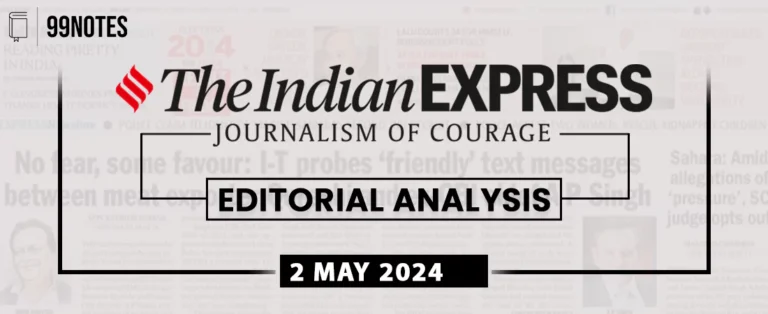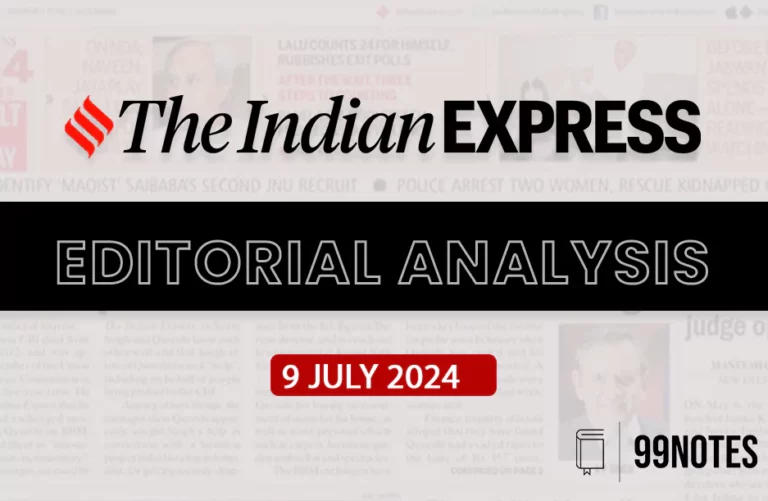22 Feb 2024 : Indian Express Editorial Analysis
Indian Express Editorial Analysis
22-February-2024
1. A CONSTITUTIONAL CRISIS
| Topic: GS2 – Polity – Executive – Functions and Responsibilities This topic is relevant for both Prelims and Mains in the context of knowing facts about constitutional roles and powers of the governor. |
| Context: |
|
Conflict within the Executive Branch:
- Governor R N Ravi’s refusal to read the text prepared by the Tamil Nadu government underscores a fundamental conflict within the executive branch.
- This act not only highlights a lack of agreement but also signifies a breakdown in the relationship between the governor and the state government, ultimately contributing to constitutional instability.
Increased Interference of Governors:
- Across non-BJP ruled states like Kerala, Telangana, Punjab, Delhi, and West Bengal, there has been a noticeable rise in governor interference, leading to constitutional friction that hampers effective governance.
- Instances such as the withholding of bills and the absence of customary Governor’s Addresses further accentuate this trend.
Governor’s Alleged Overreach:
- Governor R N Ravi’s actions, including the withholding of bills and objections to the content of the Governor’s Address, suggest an overreach of governor’s powers beyond constitutional bounds.
- The governor’s attempts to undermine the state government’s authority without substantiated reasons raise questions about the utility of the governorship in modern democratic frameworks.
Constitutional Crisis and Federal Structure:
- The recurring conflicts and constitutional crises, exacerbated by governor’s interventions, call for a reassessment of the governor’s role within the constitutional architecture.
- The Supreme Court’s stance on the governor’s limited discretionary powers underscores the need for a review of the governorship’s relevance, especially concerning its impact on the federal fabric of the country.
Reevaluation of the Governorship:
- The persistent challenges posed by governor’s actions raise doubts about the necessity of the governorship as an institution.
- With functional executive heads like chief ministers and collective ministerial responsibility, the role of governors appears increasingly ceremonial.
- The current constitutional crisis serves as a wake-up call, prompting a reconsideration of the governorship’s status and potential abolition as an outdated colonial relic.
Conclusion:
- The recurrent conflicts and constitutional crises stemming from governor’s actions necessitate a critical examination of the governor’s role within the democratic setup, highlighting the urgent need for reforms to preserve the integrity of the federal structure and ensure effective governance.
| What are the Constitutional Reforms suggested by Various Committees and Supreme Court? |
| The Sarkaria Commission (1988):
S.R. Bommai Judgment (1994):
Venkatachaliah Commission (2002):
In Rameshwar Prasad v. Union of India (2006):
Punchhi Commission (2010):
BP Singhal vs Union of India (2010):
NCT of Delhi v. Union of India (2018):
Kaushal Kishor v. State of Uttar Pradesh (2023):
|
| PYQ: Which of the following are the discretionary powers given to the Governor of a State? (2014) 1) Sending a report to the President of India for imposing the President’s rule 2) Appointing the Ministers 3) Reserving certain bills passed by the State Legislature for consideration of the President of India 4) Making the rules to conduct the business of the State Government Select the correct answer using the code given below: (a) 1 and 2 only (b) 1 and 3 only (c) 2, 3 and 4 only (d) 1, 2, 3 and 4 Ans: (b) |
| Practice Question: Discuss the constitutional crisis arising from the conflict between governors and state governments in India, with specific reference to recent incidents and their implications for the federal structure. (250 words/15 m) |
For Enquiry

22 Feb 2024 : Indian Express Editorial Analysis

21 Feb 2024 : Daily Answer Writing

21 Feb 2024 : Daily Current Affairs Quiz

21 Feb 2024 : Daily Current Affairs

21 Feb 2024 : Indian Express Editorial Analysis

21 February 2024 : PIB Summary for UPSC

21 February 2024 : The Hindu Editorial Notes PDF

SCIENCE REPORTER SUMMARY: DECEMBER 2023

20 Feb 2024 : Daily Current Affairs Quiz

20 Feb 2024 : Daily Answer Writing
Indian Express 22 Feb 2024 : Indian Express Editorial Analysis Indian Express Editorial Analysis
21-February-2024
1. The minimum support
Topic: GS3 – Agriculture…
mains answer writing 21 Feb 2024 : Daily Answer Writing Mains Answer Writing
21-February-2024
Q1) “The Indian Constitution is not a mere lawyer’s…
Daily Quiz 21 Feb 2024 : Daily Current Affairs Quiz 21 Feb 2024 : Daily Quiz…
Daily Current Affairs 21 Feb 2024 : Daily Current Affairs Daily Current Affairs
21-February-2024- Top News of the Day
1. Maharashtra clears 10% quota for all…
Indian Express 21 Feb 2024 : Indian Express Editorial Analysis Indian Express Editorial Analysis
21-February-2024
1. The minimum support
Topic: GS3 – Agriculture…
feb 2024 PIB 21 February 2024 : PIB Summary for UPSC PIB Summary for UPSC
21-February -2024
1. Japan commits Official Development Assistance (ODA) loan of…
Feb 2024 The Hindu 21 February 2024 : The Hindu Editorial Notes PDF The Hindu Editorial
21-February-2024
1. Having Panchayats as self-governing institutions.
Topic:…
Science Reporter SCIENCE REPORTER SUMMARY: DECEMBER 2023 ARTICLE 1: PETRIFIED WOODS
Formation of Petrified Wood
Petrified wood is formed through a process called…
Daily Quiz 20 Feb 2024 : Daily Current Affairs Quiz 20 Feb 2024 : Daily Quiz…
mains answer writing 20 Feb 2024 : Daily Answer Writing Mains Answer Writing
20-February-2024
Q1) “Fraternity means a sense of brotherhood of all Indians…




